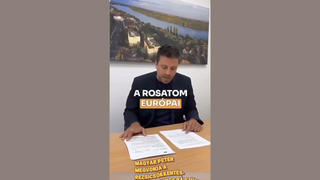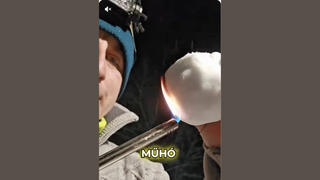
Did Péter Márki-Zay, the Hungarian opposition's joint candidate for prime minister in 2022, say Hungarians 'need to feel' the soaring energy prices that hit Europe after Russia attacked Ukraine? No, that's not true: The claim is based on an out-of-date statement Márki-Zay made in October 2021, more than four months before the fallout from Russia's invasion sent European energy prices skyward. The full version of the quote reveals that Márki-Zay was criticizing Hungary's pre-war caps on household-utility costs, saying they gave consumers little incentive to conserve energy. Even so, he affirmed he would leave the price caps in place if elected prime minister.
The claim appeared in a Hungarian-language video (archived here) on TikTok on September 8, 2023, under the caption "Fidesz," the name of Hungary's governing party. The speaker, Dániel Bohár, is a partner of the Megafon Center, which produces social-media content in support of Fidesz. Bohár said:
The Brussels bureaucrats of the international left wing caused the tough economic situation and the energy crisis because they reacted to the war with insane sanctions. As a result, energy prices are now rising... As if this weren't enough, the Hungarian left wing immediately went for even more brutal sanctions and austerity measures. According to Márki-Zay, there is no need to protect Hungarians from market prices.
The video then shows a soundbite of Márki-Zay saying:
You really need to feel the energy-price increases.
(All translations from Hungarian to English by Lead Stories staff).
This is what the post looked like on TikTok at the time of writing:
(Source: TikTok screenshot taken on Sun Sep 17 18:22:16 2023 UTC)
The energy-price hikes that followed Russia's February 2022 invasion of Ukraine battered European economies. Hungarian wholesale electricity prices shot up from an average of €194 ($207) per megawatt hour in February 2022 to €496 in August 2022, according to data from Ember, a British energy-policy think tank. Prices on the Title Transfer Facility (TTF), the Dutch market that serves as a benchmark for European natural-gas traders, surged from around €74 to €339 per megawatt hour over the same period, according to Trading Economics, an online data aggregator.
Márki-Zay made his remarks at a political debate that environmental activist group Greenpeace streamed on its Facebook page on October 14, 2021, four months before the war broke out. At the time, Hungarian wholesale electricity and TTF gas were trading at roughly the same prices as in February 2022 - but thanks to the utility-price caps, Hungarian consumers were buying electricity and gas at deep discounts.
At the 31:22 mark of Greenpeace's video, Márki-Zay said:
Cheap energy, utility-price caps, by the way, lead to overconsumption... For example, in the United States I saw, in 2008-2009, gasoline prices shot up terribly... from around barely $2 they went up to between $4-5, even. And I saw that my colleagues, who had previously gone to work in big gas-guzzling SUVs... three colleagues traveled 50-60 kilometers from the same city in three cars. Suddenly my boss purchased a hybrid car, the three colleagues divided driving duties among each other in one car. So in order to make the economy sustainable, you really need to feel the energy-price increases... If we don't realize these in the price [paid by consumers], we won't give people an incentive for conservation.
Asked if he would abolish the utility-price caps, Márki-Zay said at the 32:56 mark:
The problem is that irresponsible economic measures, such as the utility-price caps, are very easy to promise, to provide, but incredibly difficult to get rid of... We are not talking about abolishing the utility-price caps.
Márki-Zay added that he wanted to implement what he called "real price caps," such as helping people insulate their homes in order to keep utility bills sustainably low.
At the time this TikTok appeared, both Hungarian wholesale electricity and TTF gas prices had dropped back to well below pre-war levels, according to Ember and Trading Economics.













